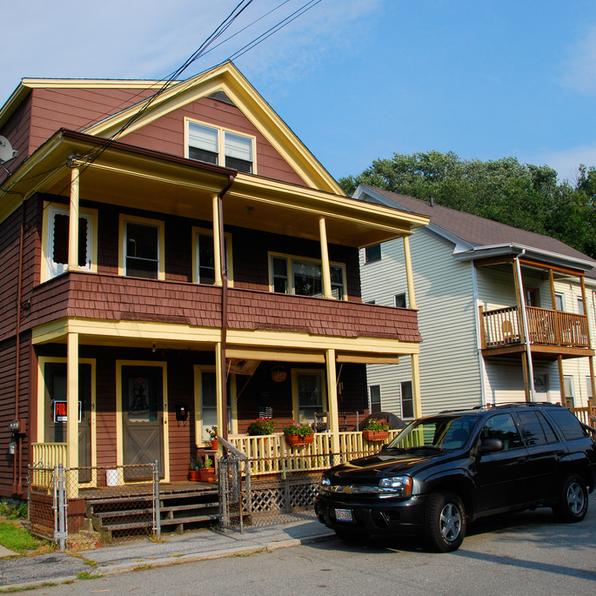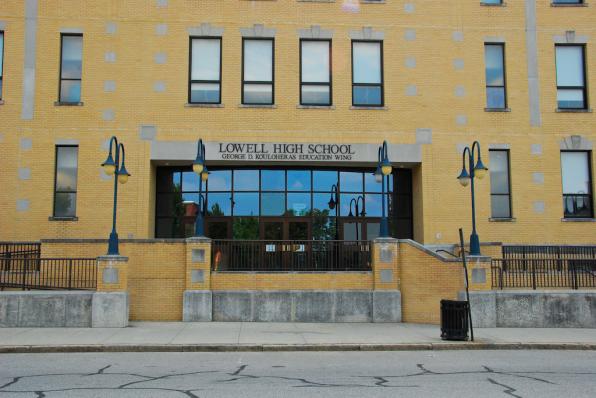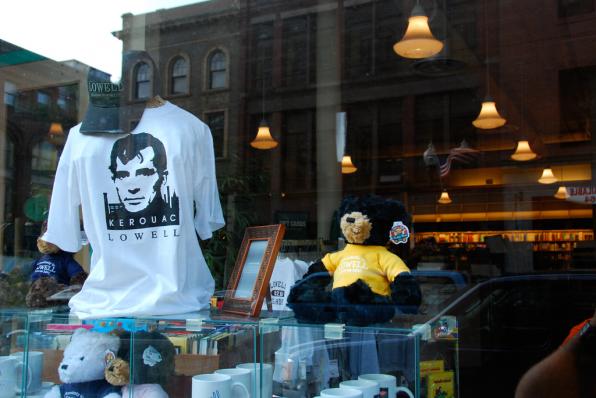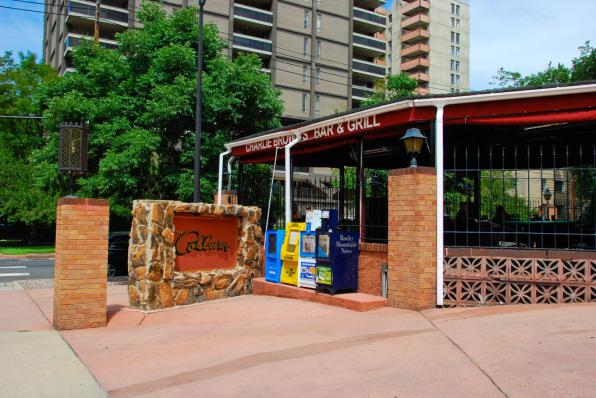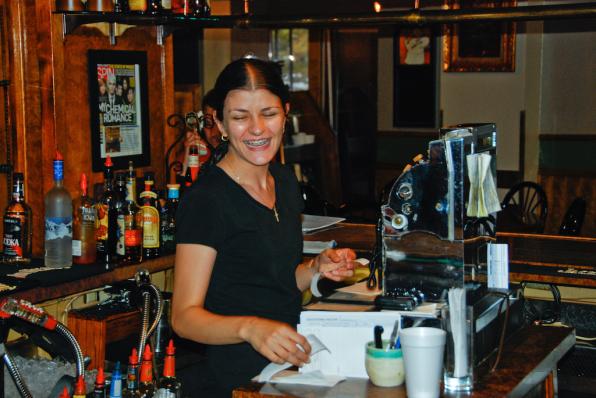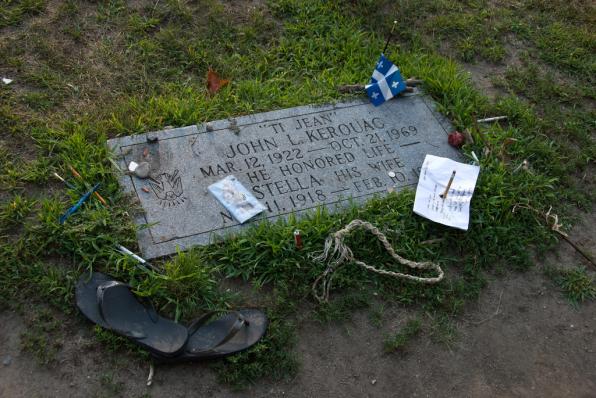In what ways is Jack Kerouac ― the man synonymous with beat culture, the American highway, and the merging of free jazz and literature ― linked to Greece and the Greeks? Apparently in quite a few ― and not just from when the whole Beatniks΄ posse visited the country on their way to Morocco.
By Lamprini Thoma
Pictures by Nikos Ventouras
The house at 9 Lupine Road, Lowell, MA, is for rent. “Three bedrooms, big kitchen”. There's a polished oval sign hanging by the door, that might explain an increased price: “Writer Jack Kerouac was born here”. Across the road, another sign describes how there once were five brothers living there, one of whom died in the Korean war, while the other four were killed in World War II. Two more of Kerouac’s friends and neighbours died in the same war at a similar age: George Apostolos and Sammy Sampas ― the Greek boys.
![]()
There were lots of Greeks in the neighbourhood. Even today, there are lots of Greeks in Lowell, MA; you can’t miss them even if you wanted to. Paul Tsongas, Christopher Makos, Olympia Doukakis, Michael Tsiklis, are all Lowell’s children. The town's Stadium is called the “Tsongas Arena”. Kerouac's high school is the “George Kouloheras High School”. And Kerouac's own closest childhood friends were George Apostolos and Sebastian Sambakakis.
![]()
He left Lowell to study in New York. He had a house on 20th street. Then he left college to find his homeland. Ithaca haven’t fooled him. He found his herd, a new language, a new kind of revolt, psychoactives and amphetamines, jazz, the soul of a world to come. In Baltimore, at the African American history museum, his name is next to the picture of Billie Holiday. “It's not the words so much as their great harmonic tune and the way Billie sings it”, he wrote about “Lover Man”. Greeks and blacks, On the Road.
“I dug Chicago after a good day's sleep. The wind from Lake Michigan, bop at the Loop, long walks around South Halsted.”
Why South Halsted in particular? Streets in Chicago, are marked as south and north, west and east, but this one, South Halsted has historically been the centre of the “Greektown”. Even though today many Greeks have left because of the construction of the interstate that passes through the area, their shops, their feasts and their chicagoan heart all still live on here. As does the Hellenic Museum of Chicago.
![]()
Back in the day Greektown was bursting with Greek immigrants and their coffee shops, restaurants, shops and “gyros” places. Those decades right after WWII the area was essentially a Greek village. One wonders why Kerouac preferred to document his time there of all places ― and not the shiny Chicago downtown, Chinatown, or Little Italy. Perhaps hanging out with the Greeks was something that connected him to his Lowell years. Perhaps, an outsider to America himself (he was born to French-Canadian parents and only learned English at the age of six), he felt connected to the ways of those immigrants and their outsider's perception.
“He let me off at Larimer Street. I stumbled along with the most wicked grin of joy in the world, among the old bums and beat cowboys of Larimer Street”.
Denver, Colorado has been called “the meat of [On The Road's] literary sandwich”, because of Neal Cassady. This infamous son of Denver (and a car thief, a school drop out and juvenile delinquent), immortalised in “On the Road” as Dean Moriarty, Jack's beat protagonist, managed to make all the beatniks fall in love with Denver.
Since 2011, “Jack was here” stencil signs, with a young, happy Kerouac can be seen at all the places he hanged out while in Denver. Larimer Street has a fair share of those. Back then it was not like it is today. There were no hip restaurants, no nothing. This was “Denver’s skid row”.
“I pictured myself in a Denver bar that night, with all the gang, and in their eyes I would be strange and ragged and like the Prophet who has walked across the land to bring the dark Word, and the only Word I had was 'Wow!”
Neal and Ginsberg arrived first. They stayed at Colburn Hotel before they ran out of money. Then they worked in the park, near the library. Kerouac met them at the Colburn on his first day in Denver. They spend the evening drinking at the hotel’s “Charlie Brown” bar. It was there were Cassady met his second wife, Carolyn. As for Jack, he fell in love with the waitress.
![]()
“Catherine Barns worked here as a waitress. I've met her, she died about ten years ago, may God rest her soul. She used to say that Kerouac went nuts on her. Huge romance. He would come here everyday, sit at the same table, inside, at the corner, read, write and try to make Catherine fall for him. He was bringing her flowers, flirting with her, he even asked her to marry him. She refused, she was a little scared of him as he was so intense. And she was an independent woman”. Anna, the daughter of the Greek owner of the Charlie Brown, shows us Kerouac’s table, his corner. The Charlie Brown was always in Greek hands ― her father bought it from the original Greek owner about 20 years ago. She is not the only Greek ― well half-Greek as her mother is Mexican, in the bar. Maria at the cashier’s is Greek too, as is Stratos, the waiter.
![]()
“We all know that Kerouac use to frequent here. People from all over the world come and ask about him. But the details, those are known by the owner, Yorgos Andrianakos. He is in Greece right now, at his village, Pikerni in Arcadia. We are all from there. You know it? Have you ever been there?”.
Jack finally returns to Lowell. Home. It had to be autumn as, “everybody goes home in October”. He went back, got drunk, got grumpy, found consolation ― or, perhaps, just a companion and nurse for his beloved mother, Gabrielle ― in the arms of Stella Kerouac, nee Sampas, his third wife. Stella was the sister of his Greek best friend, Sammy, who died in World War II.
Withdrawal and alcohol killed him. He died young, leaving everything to his mother who died five years later and left everything to Stella. Or not. The bitter battle for Kerouac’s estate took decades in courts. Meanwhile, Jack was buried among the Greeks, together with Stella, at Edson Cemetery. And it is the Greeks, the Sampas family, that has the rights to the Kerouac estate ― an estate worth nothing at the time the beatnik died, but millions as his legacy lingered on.
![]()
